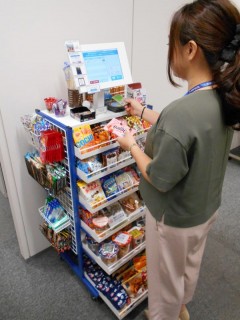Loading
Search
▼ Unattended Sales Stands Increasing
- Category:Shopping
TOKYO (Jiji Press) — More and more convenience store operators and food makers are installing unattended sales stands or vending machines in business offices, in a bid to tap demand from busy white collar workers.
Convenience store operator Lawson Inc. launched this month “Petit Lawson” operations, in which the company sells such products as confectioneries and cup noodle packs at self-service sales stand, equipped with a register for electronic money payments, in offices.
Registers that only support electronic money payments enable Lawson to offer products at wider price ranges, a company official said.
Electronic money cannot be stolen, the official observed.
Lawson aims to introduce 1,000 such stands by February next year.
FamilyMart Co., a convenience store unit of FamilyMart Uny Holdings Co., is promoting the establishment of vending machines that can simultaneously handle products with different storage temperatures, including bread, onigiri rice balls and salad.
“I don’t want to go to convenience stores outside because they are crowded,” said a woman who bought a salad during a lunch break at an office building in Tokyo’s Marunouchi business district.
“I often use this vending machine because the products are frequently changed.”
Suntory Beverage & Food Ltd. has developed a vending machine for drinks that can be linked to users’ smartphones to support their health.
Users can exchange points earned by walking certain distances with a smartphone pedometer for beverages approved by the government as having specified health benefits.
The company aims to set up a total of 10,000 units of the vending machine at 2,000 companies by the end of August.
Confectioner Ezaki Glico Co. is a leading force in such services for Japanese businesses, with its Office Glico service launched in 1998.
Under the service, the company installs a box filled with various kinds of confectioneries in drawers at business offices, collecting money and reloading products at routine visits.
The spread of the box accelerated after its food storage features drew attention following the March 2011 massive earthquake and tsunami.
The number of such boxes installed at offices has reached over 130,000, with a wider range of products now offered, including face masks.
Convenience store operator Lawson Inc. launched this month “Petit Lawson” operations, in which the company sells such products as confectioneries and cup noodle packs at self-service sales stand, equipped with a register for electronic money payments, in offices.
Registers that only support electronic money payments enable Lawson to offer products at wider price ranges, a company official said.
Electronic money cannot be stolen, the official observed.
Lawson aims to introduce 1,000 such stands by February next year.
FamilyMart Co., a convenience store unit of FamilyMart Uny Holdings Co., is promoting the establishment of vending machines that can simultaneously handle products with different storage temperatures, including bread, onigiri rice balls and salad.
“I don’t want to go to convenience stores outside because they are crowded,” said a woman who bought a salad during a lunch break at an office building in Tokyo’s Marunouchi business district.
“I often use this vending machine because the products are frequently changed.”
Suntory Beverage & Food Ltd. has developed a vending machine for drinks that can be linked to users’ smartphones to support their health.
Users can exchange points earned by walking certain distances with a smartphone pedometer for beverages approved by the government as having specified health benefits.
The company aims to set up a total of 10,000 units of the vending machine at 2,000 companies by the end of August.
Confectioner Ezaki Glico Co. is a leading force in such services for Japanese businesses, with its Office Glico service launched in 1998.
Under the service, the company installs a box filled with various kinds of confectioneries in drawers at business offices, collecting money and reloading products at routine visits.
The spread of the box accelerated after its food storage features drew attention following the March 2011 massive earthquake and tsunami.
The number of such boxes installed at offices has reached over 130,000, with a wider range of products now offered, including face masks.
- August 2, 2017
- Comment (0)
- Trackback(0)


